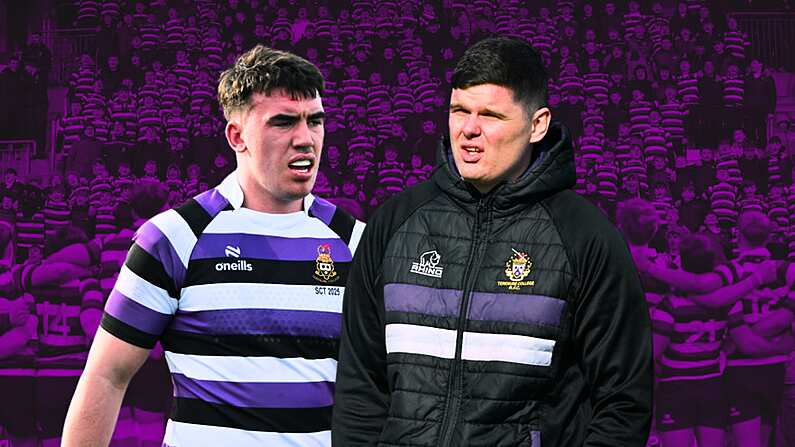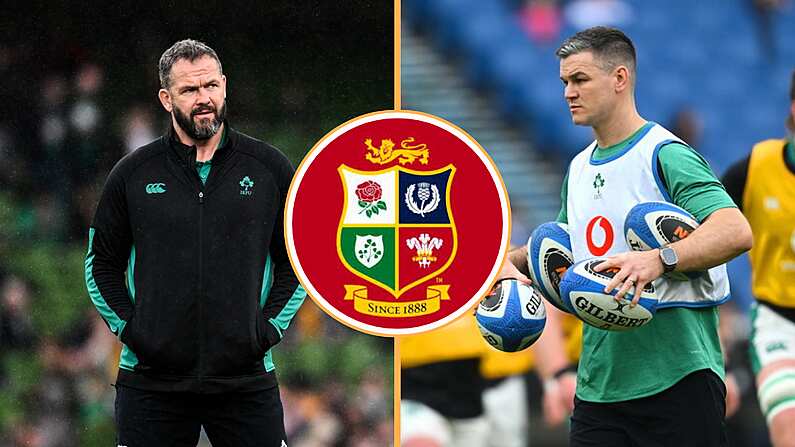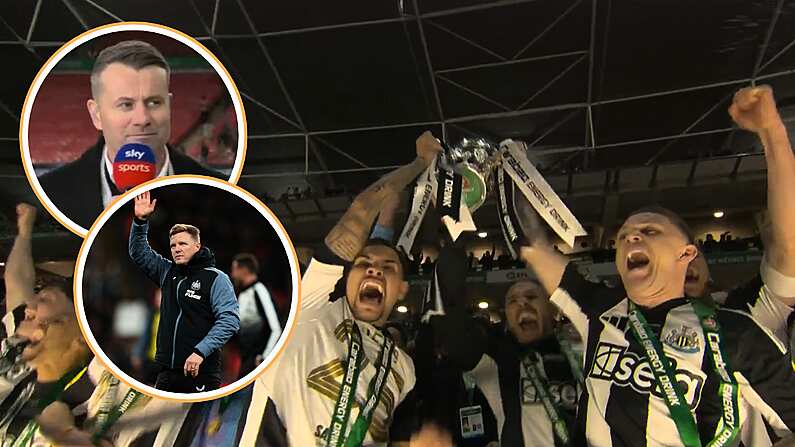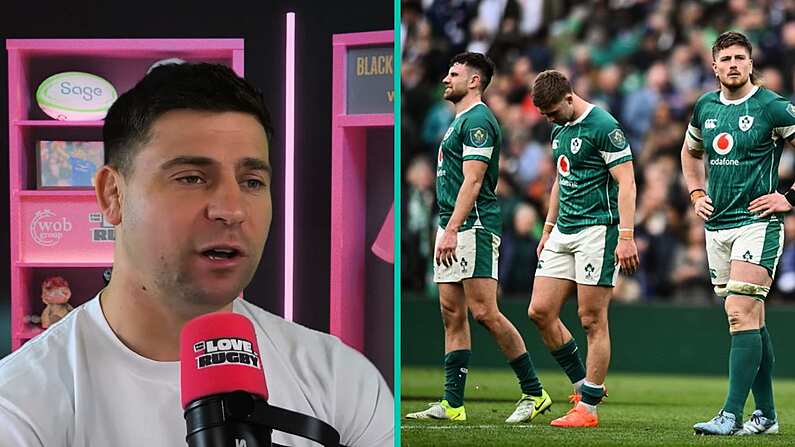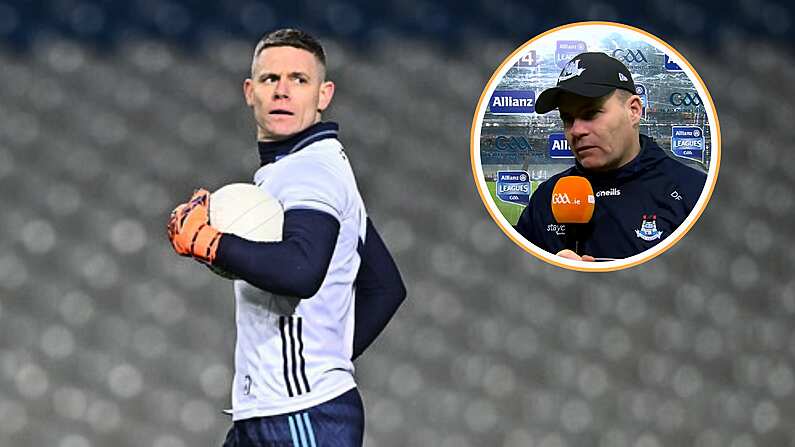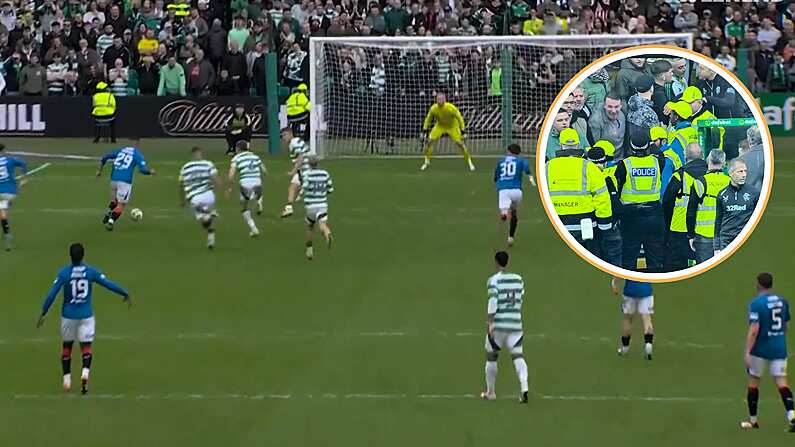Perhaps the most surreal detail of the story emerging from Rio of Pat Hickey's arrest is the claim from the BBC that Hickey actually attempted to escape when the police came for him.
The details are still hazy. Considering he was originally detained by the police while wearing his dressing gown (as Matt Cooper has pointed out, we can't discount the possibility that it's a judo outfit) escape would seem like a tall order.
But then he has managed to escape so many scrapes in the past. Perhaps he felt that dodging the clutches of the Brazilian police would be an easy ask.
UPDATE: The word is now that Hickey's wife told Brazilian police that he left the country following his meeting with Shane Ross. It looks like there was an attempted escape.
Pat Hickey arrested in Rio in his dressing gown is both deserved and hilarious. pic.twitter.com/R6q1XuZrra
— Cillian Drury (@Cillers101) August 17, 2016
JUDO CHAMP
His rise to the top of the Irish Olympic movement had unlikely beginnings. In 1979, he became President of the Irish Judo Association (needless to say, he is now an Honorary Life President of the Judo Association).
He acquired a black belt, became national champion and competed for Ireland internationally. He managed the Irish Olympic judo team at the Olympics in Los Angeles in 1984.
He still has an abiding love for the judo, a love which he shares with the Russian President Vladimir Putin. He was a special guest of the Russian Pres at the judo at the London Olympics in 2012. Hickey had only recently been elected to the Executive Committee of International Olympic Committee (IOC).
pat hickey is at the judo today as a special guest of president putin #bromance
— Ken Early (@kenearlys) August 2, 2012
Hickey succeeded Des O'Sullivan as President of the OCI back in 1989, a rower who held the position for a mere 14 years. These OCI Presidents last longer than Russian Tsars.
And it was the votes of small sports like judo that both enabled him to rise to the top and then sustained him in the job for the last 27 years.
Early on in his career in sports administration, Hickey realised that these small sports have exactly the same number of votes on the council as the big sports. He went after the votes of these smaller federations and ensured they were well looked after.
POLITICIANS
Hickey has held the IOC top job since 1989, a period which taken in seven Olympic Games, including Rio. In that time, he has jousted with numerous sports ministers.
It is often alleged that he finds some politicians terribly easy to get on with, particularly those who don't have to rely on their electorates to remain in power. Some of the world's most notorious tyrants know him as 'Pat'.
By contrast, his relationship with several Irish politicians has been rancorous.
Last week, Hickey essentially told Shane Ross to get lost when Rosser suggested the OCI should appoint an independent figure - a representative of the taxpayers who fund the OCI, if you will - to their internal inquiry into the ticket touting scandal in Rio.
An Irishman called Kevin Mallon had been arrested in a Rio hotel the week before. OCI tickets were seized as part of an operation targetting an alleged ticket touting scheme.
The OCI refused point blank citing legal advice. Ross did not accept they had any legal basis to say this. The OCI baldly insisted they would not co-operate with any government inquiry into the matter.
Ross came out of the meeting flabbergasted. He declared himself 'stunned' and said the government had 'met a brick wall'.
Pat Hickey described the meeting as 'excellent'.
It's not the first time Hickey had played the hardest of hardball with politicians.
He referred to Cork TD Bernard Allen, the Minister for Sport during John Bruton's rainbow coalition government in the mid-90s, as 'Fuhrer'.
The Sports Council of Ireland had recommended that the distribution of government sports funding be changed. The OCI had previously enjoyed a role as distributors of sports funding.
Bernard Allen implemented the advice and ended the OCI's role as a distributor of funds. Hickey hit the roof and even threatened the minister with legal action.
However, it was Jim McDaid with whom he had the most bitter dispute. At the Sydney Olympics, he got into a big ruckus with then Sports Minister McDaid in a dispute over accreditation. Hickey gleefully described the dispute in an interview with Malachy Clerkin.
And we said, ‘No – we’ll f**king decide who gets the accreditation. And what have you got against poor John Treacy anyway?’
It was brilliant! He actually went through political channels then and got onto the Australian department of foreign affairs. And he got a letter back saying, ‘If you want to go to Sydney, you have to go through Pat Hickey’. He was raging! It was great!
In 2004, he had at the Irish sailing team over their performance in Athens. McDaid, though no longer sports minister, still held very definite views on Hickey. McDaid described Hickey as "divisive, corrosive, and a national embarrassment" and called for him to go.
However, he hasn't fallen out with all Irish politicians. He described Fianna Fail's former sports minister Frank Fahey as a 'a great sports minister' for throwing him a few bob before the European Olympic Assembly in 1991, a gift which enabled Hickey to form profitable relationships with the Eastern European countries.
In Atlanta in '96, he was front and centre in his defence of Michelle Smith, accusing the Janet Evans and the other aggrieved Americans of something called 'Uncle-samism'. He was on scene when Bill Clinton wrapped Michelle in a hug and told his countrymen and women to lay off the accusations.
CHALLENGE
In 2001, he was challenged by Richard Burrows, a businessman and big figure in Irish sailing. Hickey's chief enemy Jim McDaid was key to persuading Burrows to run against him. Burrows had the sport of several high profile individuals and was supported by the athletics, swimming, canoeing, and sailing federations. However, there were 27 federations in total + another voting bloc comprised of the 11-member executive committee.
A spokesman made the following incorrect prediction/assertion.
This will be Pat Hickey's last four year term if he gets in and Mr. Burrows would be an excellent president in four years time if he didn't make it this time.
Hickey won the contest handily. As we know he did not depart in four years time. In fact, he has confidently signposted his imminent retirement only to remain on. London had been billed as his final Olympics.
ON THE EUROPEAN STAGE
When the Soviet Union broke up in 1991, Hickey was quick to mingle and make connections with the new emergent nations in Eastern Europe. In a piece of fortuitous timing, Dublin happened to hosting the European Olympic Assembly at the time.
He told Marie Crowe in 2013.
12 or 14 of those countries had no money, they were destitute nearly, they barely had anything to eat. At the time we had a great sports minister in Ireland, Frank Fahey, and he gave us a few bob. We looked after those people very well and since then those guys have stuck with me solidly. I became very popular in the East more so than in the West.
It's important to remember that Hickey is not just a large and highly litigious fish in a small Irish pond, he is a big figure with the IOC, having sat on the executive board since 2012, and the most senior figure in the European Olympic Committee.
#pathickey isn't just head of an Olympic delegation. He's one of the top dogs in IOC. This is FIFAesque to have a big wig arrested.
— Matt Cooper (@cooper_m) August 17, 2016
Hickey was appointed secretary general of the European Olympic Committee in 2001 rising to become President in 2006, a position he still holds.
In this role, he spearheaded the drive for a European Games, reasoning that Europe was the only continent without such an event. The clamour for such a competition appeared especially weak among the western nations but Hickey saw it as filling an important gap in the sporting calendar. Many in the media described the games as a 'pet project' of Hickey.
Many were mystified by the need for it. The Olympic sports each already have their own European championships. But, crucially, the European Olympic Committee did not control those events.
He initially spied Belarus as the ideal territory to host the games. He met with the President Alexander Lukashenko, praising him to the skies. Alas, Belarus proved just too poverty stricken to host the games.
While attending the Eurovision Song Contest in Azerbaijan, he floated the idea of the country hosting the games. The country was governed by Ilham Aliyev, essentially a crime family accused by the Guardian of running a 'mafia state'.
Nick Cohen in the Guardian wrote:
Patrick Hickey, the EOC’s Irish president, showed how he could move from being unctuous to unscrupulous without pausing for breath as he toured the borderlands of Europe looking for any tyrant with money to spare.
Amnesty International jumped up and down at Azerbaijan's desperate human rights record. Hickey said they listened to the complaints but said he didn't have the authority to tell a state what they could or couldn't do.
Hickey stood alongside Ilham Aliyev at the opening of the games. The Games were subsequently described as an 'embarrassment'.
DEFENDING THE RUSSIANS
He remains well got with the Eastern European nations.
Hickey was scandalised by the proposal that the Russians be banned. Hickey said he was shocked at the notion that the anti-doping agencies had proposed such a thing.
Based on the contents of the McLaren report, both USADA (United States Ant-Doping Agency) and the CCSE (Canadian Centre for Ethics in Sport) called for a blanket ban on Russian athletes competing at the Rio games. Their letter, signed by Travis Tygart of USADA, was leaked to the media.
"What mandate they have to lead an international call for a ban of another nation in the Olympic family?" he asked.
Hickey, who also sits on the IOC (International Olympic Committee) executive, said that the fact that the letter was sent the day before the McLaren Report was published had called into question the independence and confidentiality of that report.
On the Sean O'Rourke show, Hickey gave a stirring defence of the IOC's decision to reject the proposed ban on the Russians.
The reality of life is that we have a duty to protect the clean athletes,” he told listeners.
Everyone talks about collective responsibility, but when you have the right to collective responsibility versus the right for individual justice that every human being is entitled to, this has to be weighed up.
For example, if you in the morning commit a heinous crime, why should your family also be sentenced and jailed as a result of that?


